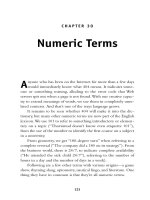Numeric Terms
Bạn đang xem bản rút gọn của tài liệu. Xem và tải ngay bản đầy đủ của tài liệu tại đây (131.16 KB, 16 trang )
A
nyone who has been on the Internet for more than a few days
would immediately know what 404 means. It indicates some-
one or something missing, alluding to the error code that Web
servers spit out when a page is not found. With our creative capac-
ity to extend meanings of words, we use them in completely unre-
lated contexts. And that’s one of the ways language grows.
It remains to be seen whether 404 will make it into the dic-
tionary, but many other numeric terms are now part of the English
lexicon.We use 101 to refer to something introductory or elemen-
tary on a topic (“Thorismud doesn’t know even etiquette 101”),
from the use of the number to identify the first course on a subject
in a university.
From geometry, we get “180-degree turn” when referring to a
complete reversal (“The company did a 180 on its strategy”). From
the business world, there is 24/7, to indicate complete availability
(“He attended the sick child 24/7”), referring to the number of
hours in a day and the number of days in a week).
Following are a few other terms with various origins—a game
show, rhyming slang, optometry, nautical lingo, and literature. One
thing they have in common is that they’re all numeric terms.
123
CHAPTER 30
Numeric Terms
cmp03.qxd 7/21/05 12:16 PM Page 123
sixty-four-dollar question (SIKS-tee fohr DOL-uhr
KWES-chuhn), also $64 question
noun The critical question about a problem; a crucial issue.
From a popular radio quiz show in the United States in the 1940s,
which offered $64 as the largest prize. The first question had a prize
of $1 and the prize total doubled with each successive question: $2,
$4, $8, $16, $32, culminating in the $64 question. With inflation,
this term is used in many variant forms, such as “$64,000 question”
and upwards.
● “‘We still don’t know if he’s an enemy combatant,’ Mr.
Dunham said. ‘That’s the $64 question.’”
—New York Times
eighty-six (AY-tee SIKS), also 86
verb tr. 1. To throw out; discard; reject. 2. To refuse to serve (a cus-
tomer).
adjective Sold out (of an item).
noun An undesirable customer, one who is denied service.
Perhaps rhyming slang for nix.
● “He says the show will go on next month, though scheduling
conflicts may move it to another hotel and the band may be
eighty-sixed.”
—Los Angeles Times
twenty-twenty (TWEN-tee TWEN-tee), also 20/20
adjective 1. Possessing or relating to normal vision. 2. Having abil-
ity to see an issue clearly.
From a method of testing visual acuity involving reading a chart of
letters or symbols from 20 feet away.
124
ANOTHER WORD A DAY
Children enter school as question marks and leave as periods.
—
N
EIL
P
OSTMAN
,professor and author (1931–)
cmp03.qxd 7/21/05 12:16 PM Page 124
● “As pundits of power go, Machiavelli was a prince. Ophthal-
mologically speaking, Ted Levitt’s twenty-twenty vision into
marketing myopia was farsighted. Saint Peter of Drucker,
arguably this century’s most influential management thinker,
has probably inspired more effective executives than a Covey of
business gurus.”
—Fortune
NUMERIC TERMS
125
17 Stories about 86
The source of the term eighty-six isn’t certain, but theories
abound. We don’t yet have definitive proof to confirm a sin-
gle theory. However, the most popular one, that it originated
at Chumley’s bar at 86 Bedford Street in New York City’s
Greenwich Village, is not the right one, based on the evidence
that the term was in existence before the bar came into
being. Here are some stories about the origin of the term:
I was told by a bartender friend that the derivation of
“eighty-sixed” comes from the Old West. Alcohol was once
allowed to be 100 proof in strength, and when a regular was
known to get disorderly, he was served with spirits of a
slightly lower 86 proof. Hence he was 86ed.
—Marc Olmsted,Albuquerque, New Mexico
There’s a bar/restaurant called Chumley’s, at 86 Bedford Street
in Greenwich Village. The bar has a formidable history as a lit-
erary hangout, but more important, as a speakeasy. The place
is known for having no identifying markings on the door, and
at least four or five hidden passageways that led to exits, some
into adjacent apartment buildings. To “86-it” meant to simply
vanish from a “dining” establishment. It’s not hard to imagine
how that evolved to mean “take a special off the menu,” or any
of the other interpretations it’s given today.
—David G. Imber, New York, New York
Any fine morning, a power saw can fell a tree
that took a thousand years to grow.
—
E
DWIN
W
AY
T
EALE
, naturalist and author (1899 –1980)
cmp03.qxd 7/21/05 12:16 PM Page 125
The phrase comes from the way the numbers look. The 8 is
kicking the 6 out of a bar.
—Bill Wargo, Burlington,Vermont
The term “eighty-sixed” refers to the standard height of a
door frame. In other words to be thrown out the door, you
are 86ed.
—Leslie Zenz, Olympia,Washington
The term 86 or 86ed has its origins in New York City, where
people committed suicide by jumping from the observation
deck of the Empire State Building on the eighty-sixth floor
before a safety fence was installed.
—Billy Rene, New York, New York
I heard this term came from a shaving powder (Old Eighty-
Six) from the Wild West days. Just a pinch in a rambunctious
cowboy’s drink would have him heading for the outhouse and
out of the saloon.
—Edwin J. Martz, Greenville, South Carolina
As an apprentice filmmaker I learned to use transparent light
filters to change the quality or color of the image that I was
filming. These filters are categorized by number, the highest
number being an 85 filter. The mythical 86 filter would be
totally opaque, not letting through any light at all. Hence, I
learned, the origin of the verb “86,” to get rid of something in
the way an 86 filter would completely delete any image in
front of the camera from striking the film.
—Fred Harris,Toronto, Canada
This expression originated in New York City back in the days
when there was a saloon on every street corner and elevated
trains ran along the lengths of the major avenues. One of the
lines terminated at 86th Street, at which point the conductors
would eject the drunks who had fallen asleep on the train.
Sometimes the drunks were belligerent. The conductors took
to referring to them as 86s.
—Tom Fedorek, New York, New York
126
ANOTHER WORD A DAY
For what is a poem but a hazardous attempt at self-understanding:
it is the deepest part of autobiography.
—
R
OBERT
P
ENN
W
ARREN
,novelist and poet (1905–1989)
cmp03.qxd 7/21/05 12:16 PM Page 126
It is a holdover from journalism days when news was deliv-
ered over the teletype. To expedite the process, sometimes
coded numbers were sent for common phrases and actions.
For example, when a story was complete, the number 30 was
sent. To this day, copy editors in newspapers still use the num-
ber 30 at the bottom center of the last page of a story. Also
(I’ve been told), when an item was sent in error or to be dis-
carded, the number “86” was used.
—Mark Vandendyke, Concord, New Hampshire
I had thought that this term had been derived from military
shorthand and referred to the phone dial (when it had letters
on it). The T for Throw is on the 8 key and the O for Out is
on the 6 key—hence something tossed is 86ed.
—Curtis S. Morgan, Ramsey, New Jersey
So far my working hypothesis is that maybe it started as a mis-
understanding and derives from “deep six” as in buried six feet
under ground; that is, dead.
—Ronald C. F. Antony, Providence, Rhode Island
I believe this expression originated during the Korean war.
“Eighty-six” refers to the jet fighter North American F-86
Saber. Whenever an F-86 shot down a airplane during a dog-
fight it had been “eighty-sixed.”
—Sandy Megas, Redlands, California
I read several years ago that “86” refers to the standard depth
of a grave in the United States: 7 feet, 2 inches; thus to eighty-
six something is to bury it.
—Doris Ivie, Knoxville,Tennessee
Folklore has it that local code #86 in New York makes it ille-
gal for barkeepers to serve drunken patrons. The bartender
says to such a patron, “You’re eighty sixed,” and thus we get
this phrase.
—Tudi Baskay, San Pedro, California
Laughter is inner jogging.
—
N
ORMAN
C
OUSINS
, editor and author (1915 –1990)
NUMERIC TERMS
127
cmp03.qxd 7/21/05 12:16 PM Page 127
deep-six (deep siks)
verb tr. 1. To throw overboard. 2. To discard or reject.
From nautical slang deep-six (burial at sea), or from the allusion to
the typical depth of a grave.
● “Second, the PRI holds the biggest bloc of seats in both legisla-
tive houses, and Fox’s relentless condemnation of their gover-
nance during his presidential bid has strengthened their resolve
to deep-six his agenda.”
—Mexico City News
Life is like a library owned by an author. In it are a few books which he
wrote himself, but most of them were written for him.
—
H
ARRY
E
MERSON
F
OSDICK
,preacher and author (1878–1969)
I am a career restaurant worker and the story I heard about
the origin of the term 86ed has to do with the 86th precinct
of the New York City police dept. It seems that when officers
in other precincts fell out of favor with their superiors, the
threat of being sent to the rough and overworked 86th was
enough to make them toe the line. It was after overhearing
the conversations at the local restaurant among the officers
that the wait staff began to pick up the rumor and it cycled
to other restaurants and other industries.
—Shawn Chriest, Eagle River,Arkansas
In the electrical industry devices have numbers—a 27 is an
under-voltage relay, a 43 is a selector switch—and an 86 is a
trip and lockout device. An 86 operation means the affected
piece of equipment is “locked out.”
—Lane Dexter, Rockport,Washington
I recall a Johnny Hart B.C. comic strip a few years back that
made an interesting observation on the name of the “abor-
tion pill” RU-486. The folks at Roussel Uclef (the “RU”)
will tell you that the name/number was just one more in a
series of compounds. Mr. Hart, however, dissected “RU-486”
into a darkly appropriate phrase:“Are you for ‘eighty-sixing’
the kid?”
—Peter Gravely, Hickory, North Carolina
128
ANOTHER WORD A DAY
cmp03.qxd 7/21/05 12:16 PM Page 128









